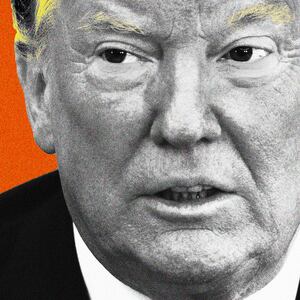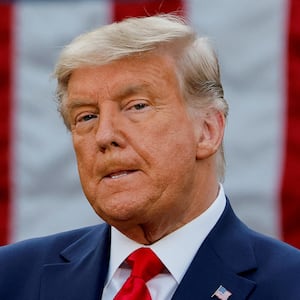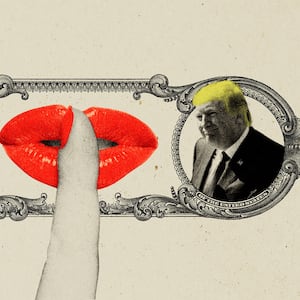“The defendant DONALD J. TRUMP repeatedly and fraudulently falsified New York business records to conceal criminal conduct that hid damaging information from the voting public during the 2016 presidential election.”
That’s how the 13-page Statement of Facts supporting the historic criminal indictment of former president Donald Trump begins, laying out the constellation of facts surrounding Trump’s efforts to hide hush money payouts. Those payouts ultimately went to three people: porn star Stormy Daniels, former Playmate Karen McDougal, and a doorman who claimed to have information about an undisclosed Trump child.
Trump was charged Tuesday with 34 counts of falsifying business records, all in the first degree—meaning they’re felonies under New York law. Those charges in the bare-bones indictment are limited to the $420,000 Trump paid his former attorney Michael Cohen in monthly reimbursements for buying silence. While false records charges are misdemeanors in New York, Manhattan District Attorney Alvin Bragg Jr. was able to elevate them all to felonies by connecting them to Trump's attempts to further other crimes.
But what's most notable about the indictment, Statement of Facts document, and press conference that Bragg delivered on Tuesday is that there is clear evidence of intent. Trump knew what he was paying for. He personally signed checks. He personally had conversations discussing the scheme. He even suggested delaying payments until after the election, dismantling the frequent argument that Trump wasn't making these hush money payments because of his political ambitions.
The Trump indictment marks a historic moment in American history. Never before has a former president been charged with a felony, let alone 34 counts. But it’s yet another way that Trump is reshaping American politics, as he forges ahead with this 2024 campaign while under the cloud of a criminal indictment.
On Tuesday, Trump pleaded not guilty to all of the counts.
Speaking to media outside the courthouse, Trump’s lawyers—already aware of the underlying facts—said they were unimpressed with the indictment.
"There's nothing,” said Trump lawyer Todd Blanche. “The indictment itself is boilerplate."
While that may mostly be true, the Statement of Facts document succinctly lays out the case.
“From August 2015 to December 2017, the Defendant orchestrated a scheme with others to influence the 2016 presidential election by identifying and purchasing negative information about him to suppress its publication and benefit the Defendant’s electoral prospects,” that document states.
To carry out the “unlawful scheme,” the Statement said, Trump and others “violated election laws and made and caused false entries in the business records of various entities in New York.” It further alleges that the participants “took steps that mischaracterized, for tax purposes, the true nature of the payments made in furtherance of the scheme.”
Trump created those false records in multiple ways, the Statement said. They drummed up fake records for the payments themselves, as well as business records to conceal the true reasons for the payments. (Trump made reimbursements to Cohen that his business characterized as “legal services” for an ongoing retainer.)
“In truth, there was no retainer agreement,” the Statement of Facts said, adding that Cohen—identified only as “Lawyer A”—did not perform legal services for Trump at the time of payment. Trump thereby caused his company to create false records “to disguise his and others’ criminal conduct,” prosecutors said.
According to the indictment, Trump made false entries in several ways—entries in duplicate corporate ledgers, checks and check stubs from the Donald J. Trump Revocable Trust, and invoices from Cohen.
Every count says that Trump created those false records with “intent to defraud and intent to commit another crime and aid and conceal the commission thereof.” But the indictment itself doesn’t charge or even allude to what those other crimes could be. The accompanying Statement of Facts, however, hangs more flesh on the story, laying out evidence to demonstrate that Trump’s alleged criminal intent extended to federal election crimes.

The Statement of Facts also explained how Bragg kicked the charges up to felonies—an object of intense speculation for weeks.
Bragg chiefly linked Trump’s criminal intent to federal campaign finance crimes already on the books—the two hush money crimes Cohen pleaded guilty to in 2018, one of which American Media Inc., the parent company of the National Enquirer, also admitted in its own non-prosecution agreement with the Justice Department.
The Daily Beast previously reported that legal experts saw this as a viable path to felony convictions. While Trump’s defense team is likely to appeal the move, New York prosecutors have previously scored convictions by tying falsified records to federal crimes; however, the question has never come before an appellate court.
Cohen’s pleas came after federal prosecutors accused him of making an illegal in-kind contribution to the Trump campaign with the $130,000 Daniels payment, along with a separate charge of facilitating an illegal corporate contribution related to AMI’s $150,000 “catch-and-kill” payment to former Playmate Karen McDougal.
New York prosecutors said Trump was directly involved with those crimes. The Statement of Facts referenced an agreement that Trump and Cohen struck with AMI CEO David Pecker at a Trump Tower meeting in Aug. 2015. At the meeting, according to the new court filings, Trump directed Pecker to “catch and kill” stories that could damage his candidacy.
In one particularly notable passage, the document presented new evidence that Trump saw the Daniels payment strictly in terms of the election—not, as he and his lawyers have argued, simply to hide the allegations from his family.
Trump, prosecutors said, “directed” Cohen to delay paying Daniels “as long as possible,” and “instructed” Cohen that “if they could delay the payment until after the election, they could avoid paying altogether, because at that point it would not matter if the story became public.” Prosecutors said they have emails and text messages to show that Cohen made a concerted effort to delay that payment.
Bragg’s office also revealed that the meeting yielded a third election-related hush payment, which occurred just months after the agreement was struck with Trump.
That payment, unlike the money to McDougal and Daniels, had not previously been revealed publicly—a $35,000 payout from Pecker to silence a Trump Tower doorman who had threatened to come forward about a child Trump allegedly fathered out of wedlock.
AMI later determined that the claim was false, the document stated. But Cohen still directed Pecker not to release the doorman from his nondisclosure agreement until after the election, which Pecker complied with “because of his agreement with the Defendant and Lawyer A,” prosecutors alleged.
The accompanying tax scheme relates to another element in Cohen’s guilty plea: The Trump Organization doubling his $130,000 to $360,000, a step that New York County prosecutors allege was designed to allow Cohen to untruthfully list those payments as income instead of a reimbursement.
Trump is not directly charged with any election or tax crimes—state or local—and the indictment does not bring further charges against Cohen or AMI. Instead, prosecutors leaned on previously established campaign finance crimes.
Despite the aggressive front that Trump’s TV lawyers have displayed in recent weeks, preemptively castigating unknown charges as weak, his attorneys have secretly been preparing him to lose this case in court, Rolling Stone reported on Tuesday. His lawyers are supposedly preparing Trump to lose this case on the first go, but win on an appeal.

The indictment—the first ever charges brought against a former U.S. president—comes as Trump faces serious legal threats on several fronts.
DOJ Special Counsel Jack Smith is reportedly in hot pursuit with twin probes—one into Trump’s role in attempting to thwart President Joe Biden’s 2020 election bid, and another into his efforts after leaving office to hoard sensitive government documents and obstruct investigators’ attempts to recover them. Fulton County DA Fani Willis is also said to be on the eve of bringing separate charges related to Trump’s alleged efforts to pressure Georgia officials into rigging that state’s election results in his favor.
In September, New York Attorney General Letitia James additionally filed a $250 million civil suit accusing Trump, his company, and three of his adult children of fraud. And then there are two other fast-moving civil cases that Trump faces: One in New York related to his alleged rape of columnist E. Jean Carrol, and another in Washington, D.C., brought by Capitol Police over the damages they suffered at the hands of his supporters on Jan. 6.
Trump, who has denied an affair with Daniels but admitted to reimbursing Cohen, insists he is “TOTALLY INNOCENT.”
The hush money payments to the women came at a critical time in the election. The Daniels transaction only happened when Trump was at his most vulnerable—directly on the heels of the infamous Access Hollywood video. Daniels had previously tried to sell her story in 2011, when Trump was publicly exploring a 2012 bid, but ramped up those efforts towards the end of the 2016 cycle. Cohen began negotiating the payout the day after the video came out, eventually settling for $130,000 in exchange for a pseudonymous nondisclosure agreement binding both Daniels and Trump to silence.
In 2018, federal prosecutors said that Cohen’s arrangement violated federal campaign finance laws against impermissible in-kind contributions, because the payment was intended to influence the outcome of an election. Cohen pleaded guilty and was eventually sentenced to three years in prison.
Trump appeared as “Individual-1” in Cohen’s plea, as well as in the DOJ’s sentencing memo, where federal prosecutors declared that “Cohen acted with the intent to influence the 2016 presidential election,” including “in coordination with and at the direction of Individual-1.”
A trial date has not been set, but most don’t expect any action on the case for at least a year, as Trump’s legal team prepares for a discovery phase of the case that could push a trial into early 2024, when states would begin holding their presidential primaries.








